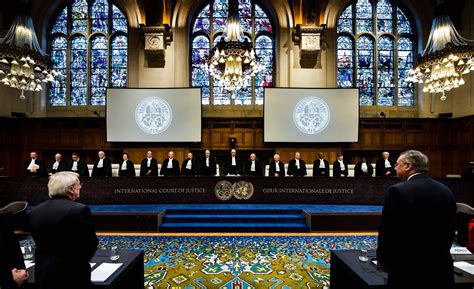The International Court of Justice (ICJ) recently ordered Israel to halt its military operations in Rafah, a move that has provoked a variety of responses and exposed some critical issues within the realm of international law and governance. At the heart of this decision lies the perennial question of the efficacy and authority of international bodies when dealing with powerful nation-states. While some see this as a necessary intervention to curb human rights violations, others view it as a futile gesture given the likely non-compliance by Israel, reinforced by its powerful allies. This dilemma brings into sharp focus the structural limitations of international governance bodies like the United Nations and its affiliated organizations.
Many commentators point out that the existence and persistence of veto powers within the UN Security Council are a double-edged sword. On one hand, they ensure the participation and support of global superpowers by providing them with a mechanism to protect their core interests. On the other hand, these very vetoes can render international legal rulings ineffectual, creating a sense of injustice among smaller nations and impeding the equitable resolution of international disputes. The ICJ’s directive to Israel serves as a quintessential example of this paradox—while symbolically significant, its enforcement is mired in geopolitical complexity and the imbalance of global power dynamics.
Historically, the United Nations was conceived in the aftermath of World War II with the hope of preventing future large-scale conflicts. Its precursor, the League of Nations, failed to achieve this purpose largely due to the absence of major powers such as the United States. The inclusion of veto powers for five permanent members of the Security Council (P5) was intended to address this shortcoming by ensuring their buy-in and cooperation. However, as some users have noted, this system has inadvertently ensured that these powers can act with impunity, especially when their interests are at odds with global consensus, thus undermining the very principles the UN was established to uphold.
Considerations of equity and representation often come to the fore in these discussions. The veto system has been criticized for perpetuating an outdated world order, one that does not reflect the changing dynamics and power shifts since 1945. For instance, countries like India, despite having significant economic and military capabilities, do not have the same influence as some P5 nations. This skewed representation has led to criticisms of the UN being little more than a ‘club of world power,’ which disregards the voices and needs of the larger international community.
The argument that the existence of the United Nations, with all its flaws, is better than having no such global forum at all is another recurring theme. The UN, despite its structural limitations, provides a platform for dialogue and diplomacy that could potentially prevent conflicts or de-escalate existing tensions. The absence of this forum could lead to an even more anarchic international order with no avenues for mediated conflict resolution, thereby potentially exacerbating global instability.
Diving deeper into the commenter opinions, one striking perspective is the role of nuclear deterrence, particularly the doctrine of Mutually Assured Destruction (MAD), in maintaining global peace. The notion that nuclear capabilities and the fear of mutual annihilation have done more to prevent a third world war than any treaty or international body suggests a world where realpolitik prevails over idealistic international governance. This perspective underscores the argument that legal and diplomatic mechanisms may often be subordinate to raw military power and strategic interests.
Furthermore, discussions around the ICJ’s authority and effectiveness bring to light the complex interrelations between judicial and executive functions in international relations. While the ICJ can issue rulings based on international law, the onus of enforcement lies with the UN Security Council, where the P5 wield significant influence. This division of power can lead to scenarios where even “unbiased” legal judgments from the ICJ may lack practical impact if they threaten the strategic interests of these dominant nations.
The broader implications of this ruling on Israel also highlight the intersection of international law and media portrayal. In a world where information dissemination shapes public opinion and policy, the ICJ’s decisions, though potentially unenforceable, still carry weight as moral and political statements. They can influence global discourse, guide domestic legislations in various countries, and inform media narratives, thereby exerting an indirect but potent form of pressure on the involved parties.
In conclusion, the ICJ’s order to Israel to cease military operations in Rafah is much more than a legal ruling; it is a mirror reflecting the complexities of international justice and the uneven terrain of global politics. Despite its limitations, institutions like the ICJ serve a critical function by providing a semblance of accountability and a touchstone for moral and legal standards in international relations. The ongoing debates around this issue underscore a fundamental truth: the quest for a truly equitable and effective system of global governance remains one of the most pressing challenges of our time.


Leave a Reply